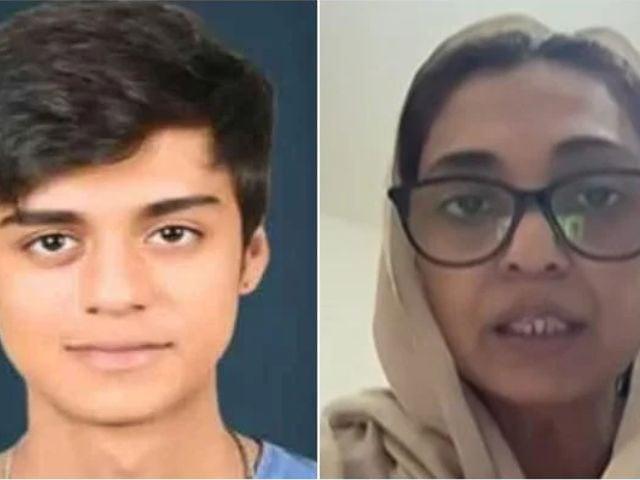The mother of youth killed Mustafa Amir firmly rejected any Diyat (blood money) offer, demanding justice for the brutal murder of her son.
Wajiha Amir, while addressing Local News Channel, said that she wanted the case to reach its legal conclusion and in no way accept financial regulations.
Her remarks occurred after she was approached by the family of the main suspect, Armaghan, during a recent legal hearing. She said that Armaghan’s mother had tried to negotiate, arguing that her son had no financial reason because he was already rich.
Mustafa Amir was kidnapped and allegedly murdered by his friends on January 6 at the Defense Housing Authority in Karachi (DHA). The police said that his body was filled in the trunk of his car and then set fire to the Balutchistan hub area.
Speaking of events leading to the death of her son, Wajiha Amir revealed that Armaghan had lied about Mustafa’s troubles when she desperately called for answers.
She also allegedly alleged that Armaghan and Mustafa had a long -standing rivalry, aggravated by jealousy and the negative influences of the suspect’s social circle.
While the investigation continues, Wajiha Amir, as well as social protection organization, led a demonstration to Teen Talwar in Karachi, demanding justice.
The demonstrators kept signs and banners, calling for justice to Mustafa. The demonstration also presented a candlelight in the memory of Mustafa, his mother actively participating.
In addition, a judge keeping the murder case Mustafa Amir was stripped of administrative powers after a panel of the High Court found irregularities in his decision to refuse the pre -trial detention of the accused.
The decision follows allegations of record falsification and exceeding, aroused concerns concerning the integrity of the procedure.
A bench of the High Court of the Sindh of two members, led by judge Zafar Rajput, made a detailed verdict, ordering that the judge of the Court Anti -terrorist (ATC) Zakir Hussain be withdrawn from his administrative role.
The court has concluded significant procedural violations, in particular poor management of requests for referral and unauthorized changes to official documents.
According to the decision, the judge exceeded his authority by refusing police custody of the accused, Armaghan, despite the investigators presented.
The decision was particularly controversial because the judge initially approved the pre -trial detention of the police, but then modified the judicial custody order using correction fluid.
The High Court’s decision has highlighted serious shortcomings in case management, declaring that the Hussain judge had maintained the head of the investigation pending three hours before asking him verbally to carry out a medical examination of the accused.
This delay, noted the court, hampered the investigation process.
The verdict also stressed that the judge had made an order for a joint investigation team (JIT) in the case – a decision that neither the accusation nor the defense had requested.
The prosecutor and police officials subsequently challenged this directive, arguing that it had been published without appropriate legal grounds.
Armaghan medical examination found marks of injury on the lower body, forehead, ear and neck.
However, the legal doctor’s report did not confirm whether these injuries resulted from the torture of the police.
The judge had cited allegations of police brutality as a reason to refuse pre -trial detention, but the high court found no evidence to justify his decision.
The High Court of the Sindh ordered the Chief Justice and the Minister of the Interior to reallocate the administrative powers of the judge before another anti -terrorist court in the public interest.
The verdict stressed that judges of the courts of first instance are responsible before the High Court and must follow the appropriate legal procedures when making decisions on the custody and the orders of investigation.
The decision also ordered that copies of the decision be sent to the acting Sindh -Chief Judge and the Interior Provincial Secretary, ensuring that the case is officially examined at a higher judicial level.




